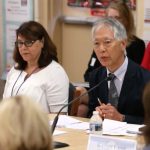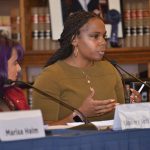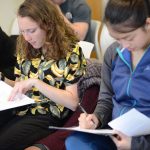In a nutshell, PBIS is an approach to addressing student behavior, a sort of scaffolding upon which teachers and administrators build practices to prevent problems and provide the right help for kids who need it. “We focus on the social and emotional success of kids but we do it in the context of academic success,” George Sugai told a packed auditorium at Southwest High School earlier this week.
The University of Connecticut will start offering what is believed to be the only full teacher preparation program in Mandarin Chinese in January. Already with what officials say is a robust World Language program, UConn would include Mandarin to a program that already turns out teachers of French, Spanish, German, Italian and Latin.
This morning, Neag School Professor George Sugai, an expert in positive behavioral interventions and supports (PBIS), was invited to speak about PBIS and improving school climate with representatives from the U.S. Department of Education’s Federal Commission on School Safety, who made a field visit to an elementary school in Maryland’s Anne Arundel County to learn more about the impact of implementing PBIS practices.
Neag School graduates from the Class of 2018 share insights into their most memorable UConn experiences — from Education Abroad to internships and more.
West Virginia, Oklahoma, Arizona. Across the country, teachers have been striking for better wages. This hour, we talk about the challenges facing public school teachers nationwide and here in Connecticut. Have we invested enough in the professionals who educate the next generation? Neag School’s Richard Schwab was a panelist.
The Neag School of Education hosted more than 150 special education directors, special education advocates, service providers, attorneys, parents, teachers, and school administrators from across the state this past week for its second annual Special Education in Connecticut Summit.
Students of color in UConn’s Neag School of Education are fortunate that their predecessors established an organization called Leadership in Diversity.
Almost five years ago, students formed the group to build a support system for future teachers of color at the university. It’s a mentoring program intended to give students the tools and networks that will enable them to succeed in their careers as educators.
This past Saint Patrick’s Day, members of the Neag School of Education Alumni Board; Neag School faculty, staff, and administrators; friends of the University; and families gathered around tables draped in purple in the Rome Ballroom of the University of Connecticut’s Storrs campus to celebrate the achievements of seven Neag School alumni during the 20th annual Neag School of Education Alumni Awards Celebration.
The Neag School of Education, the UConn Department of English, and the Connecticut Writing Project (CWP) at UConn are proud to announce Connecticut’s winners of the 25th annual Letters About Literature competition, a nationwide contest sponsored by the Library of Congress for students in grades 4 through 12.
The underrepresentation of high-poverty and minority populations in gifted programs has troubled education analysts and reformers for decades. One finding in this winter’s Fordham report on gifted programming gaps was that although high-poverty schools are as likely as low-poverty schools to have gifted programs, students there are less than half as likely to participate in them. This is complemented by a recent University of Connecticut finding that school poverty has a negative relationship with the percentage of students identified as gifted.





